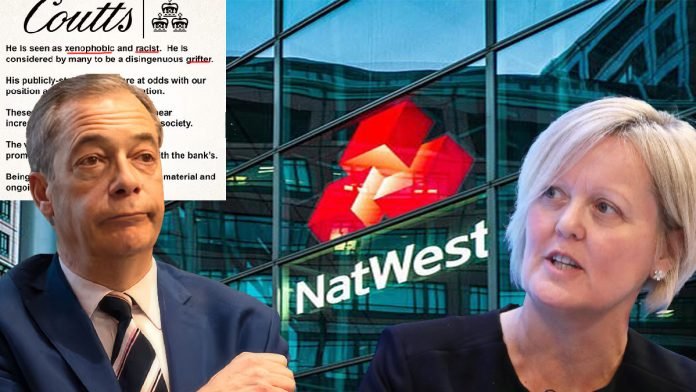The Threat of Political Bias in Banking
Regardless of one’s views on Nigel Farage, the decision by Coutts bank to shut down accounts associated with him sets a worrying precedent. Whether left wing or right wing, no citizen should face financial exclusion due to their political opinions.
This is bigger than Farage or the Brexit debates. It’s about whether banks get to quietly control who participates in public life. Maybe today it’s a right-wing loudmouth feeling the heat. Tomorrow it could be any troublemaker rocking the boat too much – environmentalists, minorities, activists of all types. Once political discrimination becomes normalized, we’re all in danger.
Banks deciding who can and cannot access services based on partisan positions is an extremely dangerous development. It grants enormous unaccountable power to financial institutions over civil liberties. A bank should never dictate which political causes or candidates its customers can support.
Nor should banks be making unilateral judgements on what constitutes acceptable politics. Their commercial interests do not qualify these private companies to control political discourse by withholding vital services from law-abiding customers.
It is understandable why many oppose Farage’s divisive brand of politics. But freedom must include defending democratic rights for those we profoundly disagree with. Discrimination based on political viewpoint is no more justifiable when targeted against right-wing figures than left-wing ones.
The Resignation of Dame Alison Rose
The turmoil at NatWest reveals troubling issues around political bias in banking and luckily it shows the public won’t tolerate it.
Not least those that came after the dead-of-night resignation by the NatWest chief executive Dame Alison Rose who fell on her sword, at the same time lopping eight hundred fifty million quid from the bank’s ledgers. Her crime: blabbing to the media about Farage’s accounts at Coutts, sister-bank to NatWest. Now the whole banking clan’s rattled, fearing the public’s wrath.
The markets responded, with 3.7 per cent, or £850m, knocked off the firm’s value – making it the biggest loser on the FTSE 100. Her resignation meant more than £320m was wiped from the 39 per cent stake in NatWest that is owned by the taxpayer.
On the same day, Lloyds Banking Group was down 2.7 per cent despite a surge in half-year profits and Barclays dropped by 1.8 per cent. Hargreaves Lansdown analyst Susannah Streeter told The Independent that investors feared “ripple effects” from the row and the potential for tougher regulation.
The Information Commissioner’s Office (ICO) also confirmed it is examining a claim by Mr Farage that NatWest breached its duty of confidentiality. If proven, the bank could be fined up to £17m.
Coutts Bank boss to quit
And the pieces keep tumbling…The boss of Coutts, the prestigious private bank for the wealthy, has also stepped down over the handling of Nigel Farage’s bank account closure.
NatWest – which owns Coutts – said Peter Flavel’s resignation had been mutually agreed and would be immediate.
Mr Flavel said how the bank handled Mr Farage’s account had “fallen below” its “high standards of personal service”.
Mr Farage said “ultimate responsibility for the dossier de-banking me for my political views” laid with Mr Flavel.
The Dangers of Unaccountable Corporate Power Over Political Discourse
What it all boils down to is Banks wielding unaccountable power to financially exclude lawful citizens based on partisan positions represents an existential threat to civil liberties. Again, just to emphasise, today it is a right-wing figure affected; tomorrow it could be trade unionists or environmentalists. Once this line is crossed, where does it end?
Commercial banks lack any mandate or credibility to censor legal political activity by withholding essential services. Their commercial interests do not equip them to dictate acceptable politics. Statements in Farage’s account files about his views being “xenophobic” and “racist” expose a clear political agenda.
Is Your Bank Judging You Based on Your Political Views?
Outrage would rightly ensue if banks targeted customers over progressive activism. All citizens must have their rights protected, even those espousing objectionable ideologies. Discrimination based on viewpoint is indefensible, whether against left or right.
This issue transcends Farage and Brexit. No individual or organisation should face a bank’s effective veto over their lawful participation in civic life. The implications of normalizing such political interference are chilling.
Unbridled corporate power over political discourse and activity cannot be tolerated in a democracy. While NatWest’s chairman aptly labelled Rose’s resignation a “sad moment,” the real tragedy would be ignoring its warning about unfettered politicisation of banking.
This row must spark a broader reckoning around banks’ responsibilities and limitations. Protecting access despite political differences will require proactive legislation, not voluntary restraints. Hard lessons must be learned to avert a dangerous precipice.
How the Farage bank row unfolded:
- 29 June: Mr Farage says on Twitter his bank accounts would be closed for commercial reasons. He does not name the bank. but says he has been a customer since 1980
- 4 July: BBC reports Mr Farage fell below the threshold needed to hold an account with Coutts. Mr Farage confirms the bank is Coutts but says the closure was a “political decision”
- 18 July: Mr Farage obtains a Coutts report which said he did not align with the bank’s values.
- 19 July: The Telegraph reports Dame Alison sat next to business editor Simon Jack at charity dinner the day before the BBC’s report
- 20 July: Dame Alison apologies for “deeply inappropriate comments” and says the document does “not reflect the view of the bank”
- 21 July: The BBC updates its story to make clear its report had come from a source
- 24 July: Simon Jack and Deborah Turness, chief executive of BBC News, apologise to Mr Farage
- 25 July: NatWest says Dame Alison made a “serious error” but the board had full confidence in her
- 26 July: Dame Alison resigns. Mr Farage calls on the whole NatWest board to go
- 27 July: Coutts boss Peter Flavel steps down
Support Independent Journalism Today
Our unwavering dedication is to provide you with unbiased news, diverse perspectives, and insightful opinions. We're on a mission to ensure that those in positions of power are held accountable for their actions, but we can't do it alone. Labour Heartlands is primarily funded by me, Paul Knaggs, and by the generous contributions of readers like you. Your donations keep us going and help us uphold the principles of independent journalism. Join us in our quest for truth, transparency, and accountability – donate today and be a part of our mission!
Like everyone else, we're facing challenges, and we need your help to stay online and continue providing crucial journalism. Every contribution, no matter how small, goes a long way in helping us thrive. By becoming one of our donors, you become a vital part of our mission to uncover the truth and uphold the values of democracy.
While we maintain our independence from political affiliations, we stand united against corruption, injustice, and the erosion of free speech, truth, and democracy. We believe in the power of accurate information in a democracy, and we consider facts non-negotiable.
Your support, no matter the amount, can make a significant impact. Together, we can make a difference and continue our journey toward a more informed and just society.
Thank you for supporting Labour Heartlands












